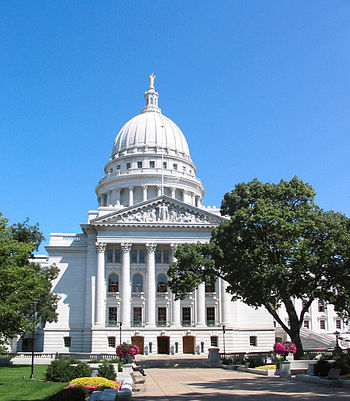| The state capitol of Madison, Wisconsin (Photo credit: Wikipedia) |
Atheists face plenty of barriers to being fully open and honest about who we are. Many of these barriers are symbolic in the sense that they communicate that we are not part of mainstream society or involve forms of social disapproval resulting from widespread anti-atheist bigotry (e.g., losing friends when they learn of one's atheism). Others are far more serious and involve forms of discrimination that would be illegal if they were done to other groups but that remain legal when they are done to us. We have had a few victories along the way when it comes to eradicating this sort of discrimination, but the sad reality is that it remains perfectly legal in much of the U.S.
Madison, Wisconsin recently became the first city in the United States to extend anti-discrimination protection to atheists and other secular persons. Thanks to the new city ordinance, it is now illegal to discriminate against people on the basis of their atheism just as it is to discriminate on the basis of gender, race or ethnicity, religion, age, disability, martial status, and other protected classes. The protections cover housing, public accommodations, and employment.
But if the previous laws already prevented discrimination on the basis of religion, why was this necessary? Interestingly, this question seems to depend on the court hearing the case. Atheism is not a religion, and courts have generally recognized this even if some Christians try not to do so. However, some courts have shown a willingness to consider atheism a religion when it comes to the question of discrimination, extending protections in obvious cases. Depending on the court, it might be legal to discriminate against someone on the basis of their lack of religious belief but not against someone on the basis of their religious belief. The Madison ordinance aims to prevent this sort of thing, offering atheists the same protection under the law as religious persons.
Imagine the impact this could have if it were to become the law throughout the U.S. Atheists would no longer have to conceal our atheism for fear of being fired, denied custody of our children, or evicted from housing. We'd still face plenty of social barriers, but discrimination against us would no longer be legal.
Of course, Madison is known to be a progressive city. I don't expect to see cities here in the South adopting such protections any time soon. Here in Mississippi, same-sex couples are not allowed to marry, and sexual orientation is not a protected class when it comes to things like housing. A landlord can legally refuse to rent to a same-sex couple. I'm not 100% sure of this, but I've been told a number of times that it is also legal for private employers to fire people based on their sexual orientation, atheism, etc. We still have a very long way to go.
In the meantime, here are some resources for atheists who have been victims of discrimination.
